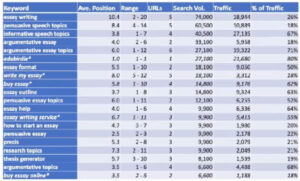The annual Plagiarism Across Europe and Beyond conference took place in Dubai in April 2020, although the delegates weren’t there in person. They were distributed around the world.
Conference chair Zeenath Khan and her team did an excellent job in moving the conference online due to Covid-19 in a very short timeframe. Of course, discussion of Covid-19 became something of a running theme at the conference as well, as this has the potential to become one of the biggest challenges to academic integrity we are likely to see in our lifetimes. It was an area I also picked up on in my opening keynote (post here and video here).
As always, I could only attend a small number of the parallel presentation sessions, so missed out on many interesting talks. But, also as always, there were many topics of interest discussed in the sessions I could attempt. Here is a summary of five sets of developments that caught my attention.
#1 – Emerging Technology Offers A Fresh Challenge, But Also Provides Us With New Opportunities To Develop Solutions

More work using forensic investigation techniques on student work had been completed by Clare Johnson, to build on the research she presented at the conference in 2019. Clare identified several suspicious tags that could be seen when extracting a Word document that showed possible evidence of plagiarism and contract cheating. Clare plans next to test the techniques against student work that has gone through academic misconduct panels to see if the same techniques hold. Assuming they do, it would be good to see if a tool could be produced to automate much of this investigation and to supply a summary of the evidence to markers.
Elsewhere at the conference, PlagScan discussed a new software development. They are adding metadata analysis to their academic integrity software, an area which would provide useful parallel data to Clare’s plans. There’s lots of potential for future work looking inside files to identify academic misconduct.
In my keynote presentation, I discussed many of the challenges to academic integrity that we will have to consider in the future. These include artificial intelligence systems that can write text that look like they have been written by a human, as well as automated marking systems that contract cheating firms can tap into. How we address these challenges is an ongoing area for discussion.
Another delegate shared their own example of an emerging trend, that of essay spinning or machine translation. Their version had a twist to it. Students studying at an institution not using English would buy an English language essay, then use automated translation software such as Google Translate to convert this to their local language. I presume they would then also edit the result to make sure that the text made sense. Detecting translated documents has always been a challenge, but it would certainly be nearly impossible to detect bespoke written work which has then gone through a translation process.
#2 – We Need To Develop Our Support Mechanisms For All Stakeholders In Academic Integrity
Often the support we provide, the written guidance we give and the training offered to students is not all aligned with modern developments in the contract cheating industry. Mary Davis talked about why students cheat. Her main finding, from talking to students, was cheating was due to a lack of time. Mary recommended helping students to structure their time and ensuring they put timelines in place for larger assignments such as dissertations.
Teddi Fishman reminded us that the language students use to think about academic integrity and cheating is often different to the language that academics use. That makes it difficult to conduct research in this are and to rely on student answers. We probably don’t know how much cheating is really going on. The question was asked, how can we address this?
We need to be more sophisticated in the type of training we offer students and allow for more complex and nuanced discussion. Mary Davis recommends getting students to go on popular contract cheating sites and evaluate what they offer (or what they say they offer). Students know about contract cheating and they probably have classmates who have used contract cheating services, so we shouldn’t be hiding our awareness from them.
One delegate shared an example related to this, which was funny but also revealing. One of their students had accidentally shared their screen and it showed that the student had been making assignment orders from an essay mill, in this case with the number running to double digits. It’s more common that most of us think.
Conferences like this one always attract people with a wide variety of experience in academic integrity. It’s always worth us including some introductory level training for the people attending a conference like this for the first time. But one theme that kept coming up is that we should be looking at having a more advanced level of training and then seeing how this can be fed back into individual institutions and discipline areas.

Robin Crockett has used R statistical analysis tools to analyse student work and to identify who wrote it. These tools are useful but it can be hard to get started with them. Perhaps we could roll out stylometric training more widely?
Mark Ricksen from Turnitin also advocated for the use of software. I’ve shared his research with Deakin University before, showing how if markers are trained and have access to authorship attribution software, they will detect more contract cheating. But that training has to be put widely into place.
How do we support researchers who are themselves victims of plagiarism or academic misconduct? They are often an overlooked group of people. Tomáš Foltýnek revealed that ENAI is setting up a new support service for such victims. A very timely and important development.
#3 – We Need Legislation To Reduce The Risks To Students
In my keynote presentation, I briefly shared an example of attempted blackmail that a student had shared with me. This was a very blackmail elaborate scheme, with the firm creating fake letters from the UK Government and stealing mailing list details from existing companies to make it look like they were acting legitimately. I can understand how students could fall for this type of scam, particularly as they know they are at risk from their information being shared.
Mark Ricksen from Turnitin also discussed his experience buying essays for research purposes, noting how contract cheating companies ask for information from students about their universities as that’s one way they can extort you.

The most comprehensive study in this area has been conducted by Lesley Sefcik and Jon Yorke from Curtin University and they presented their findings at the conference. Lesley and Jon found that students would rather pay up to people extorting them than risk their contract cheating being reported to their universities. They also shared their own example of how firms blackmail and extort students. In this case, a firm waited until a student had graduated, then threatened to report them to their university to have their degree rescinded unless they made continual micro-payments. We do need to consider how we will offer support to students who could be at risk of blackmail.
Michael Draper shared his latest findings on how legislation can be used to prevent contract cheating. He had two parallel examples. One was the UK, where there has been a lot of discussion on legislation and firms have been encouraged to voluntarily change their practice. Michael said that essay mills have not made any voluntary changes despite these requests. By contrast, Ireland had brought in legislation and that had an immediate impact in marketing and advertising. This does suggest we should continue to pursue the legislative route as one of a number of necessary parallel solutions to help us to preserve academic integrity and reduce the risk to students posed by predatory firms.
#4 – We Should Continue To Explore Data Analytics Research Opportunities
One question that emerged from my keynote presentation related to how publishing of research papers in the academic integrity field had changed. I looked at two sample terms, “contract cheating” and “academic integrity” and showed that the number of publications with those terms in the title has been increasing. But does this mean that there is more interest in the area, or have we retired the use of other terms such as “academic misconduct“? There is a potentially interesting study to be completed looking at the changing terminology of academic integrity.
Tim Daly from Zahed University had investigated how contract cheating providers use content marketing to get customers. The whole funnel of how providers develop relationships with customers is fascinating and one I’ve looked at in my own research. But Tim has really drilled down into the data and the terms students looking for help will type into Google and, rather than finding helpful pages from universities, will find information from contract cheating providers instead.
Looking for just searches from the US for the term “business essay” alone, Tim found 52 sites getting over 9,000 organic visitors each per month. That translated to over 2 million visits per month across all of those sites.

Out of the top 10 contract cheating providers for the US market, Tim found terms such as “essay writing”, “argumentative essay”, “essay outline” and “how to write an essay” were dominated by contract cheating providers. Tim also found legitimate universities linking to help pages owned by the contract cheating industry. Tim says that we need to make sure that we create good content on all of those topics on university websites so that those results appear in search engine resultss and students get directed to good information, rather than them ending up in contract cheating provider marketing funnels.
There are many opportunities to expand internationally using Tim Daly’s research methodology as a base, which only focused on the US market.
#5 Academic Integrity Is For Everyone
Are we leading by example, asked Tracey Bretag in her keynote presentation? Tracey noted that many academics take shortcuts in their own research, often bypassing ethical approval processes or submitting papers with poor analysis or referencing. If academics can’t get integrity right, can we expect this from students, asked Tracey? Tracey encouraged us to be generous with our time to grow the next generation of research and to take professional development courses where necessary.
We need the whole community to buy into the idea of academic integrity too. Teddi Fishman reminded us how important buy-in is when she presented. She advocated that we should be looking at Covid-19 as providing us with an opportunity, not just a challenge. I discussed how staff and students need to work in partnership, but really this has to extend become even the academic area. Student ethical views are heavily shaped by their home environment, where they grow up and normative behaviour within their culture.
Zeenath Khan has conducted initial research into how far parents are willing to help their primary school age children with their homework. Zeenath found evidence of parents and siblings doing homework for their children, particularly for “show and tell” presentations, along with evidence that teachers are being condescending to children whose family haven’t helped them in that way. That lack of academic integrity can then follow children throughout their time at school and influence how they choose to act when subsequently reach university level study.

Veena Mulani shared an example of how a child of 10 year old was cheating on a class being taught remotely due to Covid-19. The child had replaced their camera feed with a picture of themselves working, knowing that the teacher was looking after a large number of pupils and wouldn’t be able to tell.
Teddi Fishman also reminded us that we need to be transparent with students. She said that many of the challenges with Covid-19 could have been avoided had the world subscribed to this view of transparency.
After Teddi’s presentation, I shared the analogy of herd immunity for Covid-19 and asked delegates to consider how this could be applied to academic integrity. Can we get everyone in agreement that acting with integrity is important? If so, we can go a long way towards ensuring it simply becomes unacceptable to cheat. That’s what we need to show that conferences like Plagiarism Across Europe and Beyond are having an impact and to truly make academic integrity an important issue for everyone.
